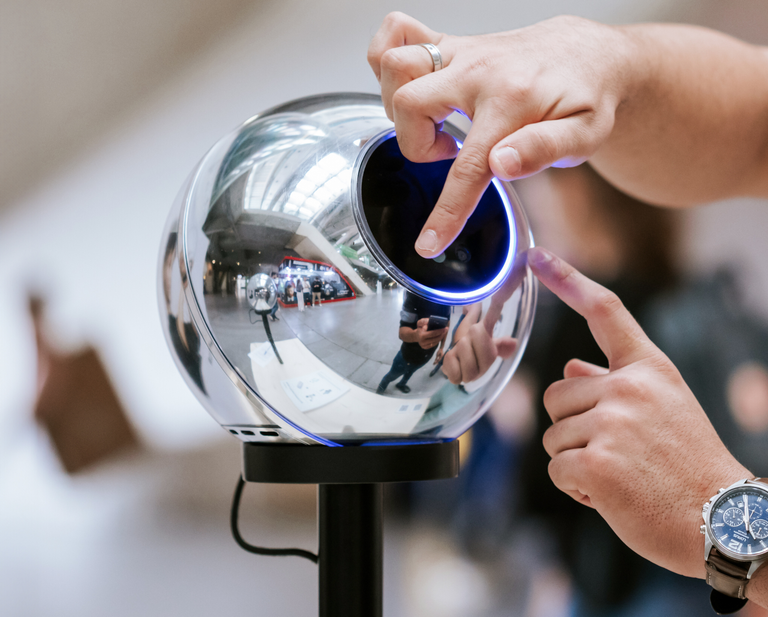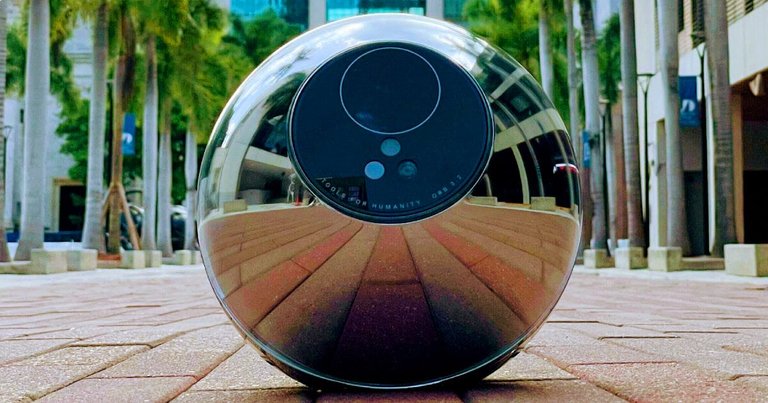Your iris for "free" crypto: analyzing WorldCoin through the Argentinean case
 Source of the image, edited with Gimp.
Source of the image, edited with Gimp.At a time when the situation is becoming more tense for many people crushed by Javier Milei's polemical adjustment, the debate about the operations of WorldCoin—a project in principle oriented "to help give everyone access to the global economy"—has re-emerged. As we know, the question "Who owns this?" is important to evaluate the level of decentralization of a given program, and in the case of WorldCoin we could say that "it is intended to become a public network, with ownership by everyone". Along the way, the WorldCoin Foundation operates as "the initial steward" of the ecosystem until it comes of age (the projection in this sense can be consulted here). Then, it is an important fact that the foundation is incorporated in the Cayman Islands, and also that it owns a company incorporated in the British Virgin Islands in charge of "issuing the 75% of all Worldcoin tokens (WLD) that have been allocated to the Worldcoin community", including those sent to the Argentines who are increasingly flocking to Plaza Houssay in Buenos Aires to register for WorldCoin.
The first step to get in is to download the World App, an application managed by a San Francisco-based corporation—with Alex Blania and Sam Altman serving as its respective CEO and Chairman—that allows you to register with WorldCoin and create a wallet, and is indispensable for obtaining and verifying a sort of "digital humanness passport" known as the "World ID". The Orb is a proprietary device that "captures a series of high-resolution images of (your irises) and face (both your head and shoulders)" to establish your "personhood", thus verifying your World ID and expanding the limited opportunities offered by simple registration via The World App. For example, it is impossible to claim the free WLD tokens without verifying your World ID at an Orb, whose availability is reduced to different locations in ten countries, with México, Chile, and Argentina as the only Latin Americans on the current list (it was available last year in the Brazilian market). Silver spheres operators are rewarded according to the people they register, which for many—like @l337m45732—equates to a pyramid scheme ("to be successful, you'll build a team, figure out where to run your operations and get people excited about starting their crypto journey", WorldCoin encourages these Orb operators, while warning here about how to avoid potential fraudulent practices related to them). The project states that it only processes your biometric data to ensure that you don't go twice to an Orb while offering two options for deciding the fate of the images with your irises, eyes, and face taken with the custom device.
In one of them, the user gives consent for WorldCoin to retain his/her data—storing it in regional buckets installed in Brazil, India, the United States, Singapore, South Africa, and Europe—and transfer it to its teams in Germany, Poland, and the United States (in this way, as a plus, the user will most likely not need to go to an Orb to reverify his World ID in case of certain software updates). In what seems to be the most encouraged option—at least in Argentina this would be the case—, this data would only be used when creating the iris code with the Orb. In any case, WorldCoin is committed to never selling your data, even with something much more difficult to enforce, which is not to "profit" from them. But look, with the mere processing of the images—during verification—WorldCoin's powerful systems become increasingly robust and thus much more surgical and valuable (they need "images from real people like [us] to help [their] software learn"). Saltman was seeking $50 million in additional funding about two months ago to further bolster the effort.
This looks like it produces a global (hash) database of people's iris scans (for "fairness"), and waves away the implications by saying "we deleted the scans!"
— Edward Snowden (@Snowden) October 23, 2021
Yeah, but you save the hashes produced by the scans. Hashes that match future scans.
Don't catalogue eyeballs. https://t.co/uAk0NYGeZu
But, if you zoom in on the Biometric Data Consent Form—which no struggling Argentinian will stop to read, nor will this specific Privacy Notice—we find that in case the user consents to store their data in WorldCoin buckets it can be shared—always securely, they say—with Altman's corporation "to perform their tasks and duties", and with "vendors and service providers outside (WorldCoin)", such as cloud and SaaS providers, software developers, and legal specialists. As I said above, you don't have to sell to earn—indirectly if you want—and grow as a business with the processing of this juicy biometric data. In an important risk for the user, there is also the possibility that WorldCoin is forced to share your data with identity verification vendors if required by Law—complying with know-your-customer requirements, for example—, law enforcement officials, or other third parties "to comply with applicable laws and respond to mandatory legal demands". But they even reserve the right to share your personal information "in connection with, or during negotiations concerning, any merger, sale of company assets, financing, or acquisition of all or a portion of our business by another company", also under the belief that the user has violated the terms of use or the law, or if they find it necessary to protect their rights, among other grounds. Other reservations that are much more technologically focused—while still having philosophical and political connotations, such as the allusion to "technological colonialism"—are available here, here, and here.
The project was suspended in Kenya last August over concerns that "obtaining consumer consent in return for a monetary award bordered on inducement", with the government alerting citizens to the risks of handing over their data to private companies. From the outset, a key problem emerged in the process of moving WorldCoin forward, because people are more interested in the incentive they will receive than in the philosophical and organic underpinnings of what Web3 is, or the fate of their data. In truth, few Internet users in general care about the latter—think of the historical complaints against the big Meta-type tech companies—and in that sense, they will care even less when receiving a monetary benefit that they so urgently demand. "I've been coming here almost three days to line up and register. I want to register because I'm jobless and I'm broke, that's why I'm here", a Kenyan told the BBC last year. "I came here yesterday. I waited until my phone died. So I came again today but I missed the registration again. I like Worldcoin because of the money. I'm not worried about the data being taken. As long as the money comes", added another. The project was scheduled to resume operations there—"under new guidelines"—in the first quarter of this year.
Victor O. Odhiambo – IT Specialist: We can’t blame the youth and say they are lazy. I have seen a number of them go out of their way to make sure what is expected of them is achieved. Majority of the people whose data was taken by World Coin were not illiterate people, a good… pic.twitter.com/6hQvADMZMd
— Citizen TV Kenya (@citizentvkenya) February 9, 2024
WorldCoin's landing in Argentina
Argentina is a market where WorldCoin has been operating since its early days, although not without controversy, doubts, and complaints about its operations. A lawyer specializing in cybersecurity and data protection filed an appeal in August last year with Argentina's Public Information Access Agency for a potential violation of the National Law on Personal Data Protection. The state agency said then that it would investigate "the processing of personal data carried out by the Worldcoin Foundation in Argentina, to verify the security measures adopted in the framework of protecting the privacy of the digital application's users", an effort it reported on exactly one month ago. "I would like those (citizens of Mendoza) who had their iris scanned to know what they signed when agreeing to the terms and conditions: if there is any problem and you are not a European citizen, it is solved with laws, do you know from where? From the Cayman Islands", said a judge of the Supreme Court of Justice of the province of Mendoza.
 Source
SourceMore than half a million Argentines had stood in front of an Orb by the end of January, while in the social networks a movement of "enlightened" people who take advantage of the ignorance and needs of their fellow countrymen—including those who don't even have a cell phone—is becoming more and more vibrant. In the same streets, there are reports of individuals with signs reading ads like the following: "I buy Worldcoin. We are close. I pay more". From the city of Pinamar, it has been documented that even minors go to the different points where the promoters are located, although in principle you have to be over 18 years old to register. According to the referred report, the promoters—and subcontracted ones above all, I suppose—are complying to the letter with WorldCoin's call, actively approaching and recruiting as many Argentines as possible.
But what prompted me to dig a bit into all this was this recent DW report, where the onslaught of Milei's government adjustment, the need for more and more biometric data from WorldCoin, and the dangerous disdain of Argentines about their data are mixed. One cook told the German media that he registered because at the moment the country is going through "everything comes in handy". "It's not much but I survived COVID, [so giving away my biometric data] is not going to do anything to me". "It would be a matter of easy money without doing anything wrong. [It means somehow] handing over your biometric data but sometimes necessity wins out", says one unemployed young. Another, who works in supermarkets, says that perhaps he has doubts about where his data is going, but he still joined in. "I was quite trusting, but they told me [about] 30 dollars and I went for it. People stop, it's 30 dollars", an Argentine mother told Clarín.
Eligible verified users, including Argentines, can claim 1 free WLD token each week, according to WorldCoin. But as long as people don't become literate in Web3 concepts—something that Orb operators don't seem to encourage and probably don't know much about anyway—, and don't go beyond obtaining a few dollars that inflation will shred sooner rather than later, Altman will just continue expanding his buckets to power WorldCoin's AI-driven systems, and so buying desperate people's irises at a bargain price.

Posted Using InLeo Alpha
https://inleo.io/threads/limonta/re-limonta-otqbvzyp
The rewards earned on this comment will go directly to the people ( limonta ) sharing the post on LeoThreads,LikeTu,dBuzz.